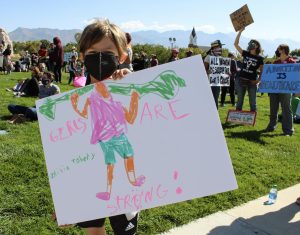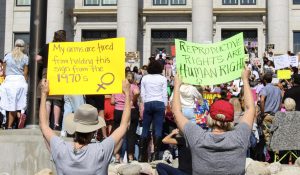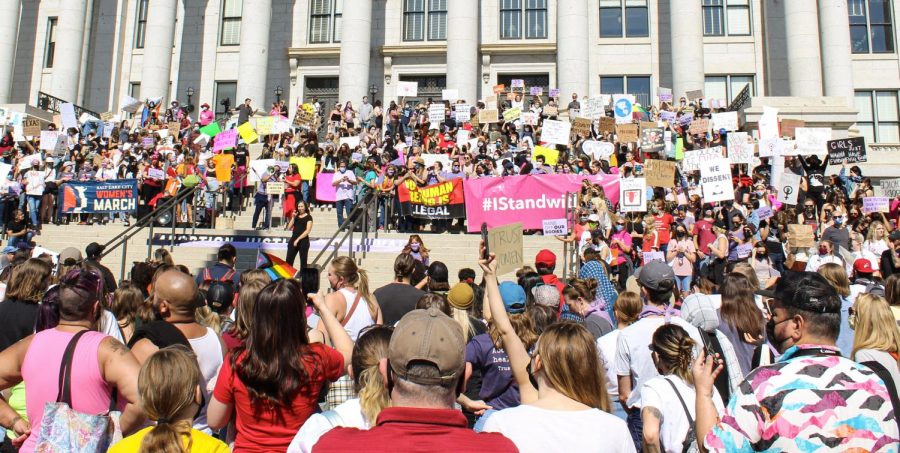Salt Lake Streets Filled with Calls for Reproductive Rights as Part of National March
Protestors for reproductive justice gather at the Utah State Capitol building for the 2021 Women’s March (Photo by Brooklyn Critchley | The Daily Utah Chronicle)
October 3, 2021
On the morning of Oct. 2, a thousand people gathered around Washington Square to protest the current abortion bans going on in Texas and around the nation. Across the country, more than 650 marches took place with over 40,000 people.
As people began the march up State Street, they chanted “My body, my choice,” joined by the voices of others yelling “Their body their choice,” “Separate church and state” and “Stand up, fight back.”
Robin Young, a University of Utah student majoring in communications and economics, went to the march with her mother, sister and grandmother. At the march, Young said she felt a sense of community and was surprised to see so much support.
“Sometimes, especially as a woman, it is easy to feel alone,” she said. “It was really cool to be able to feel a little bit less alone today.”
Young said the movement for abortion rights is not a solitary issue.
“This really is tied to the Black Lives Matter Movement, it’s tied to the Trans Lives Matter Movement, and it’s all combined,” Young said. “It’s a part of a larger, more pervasive, more invasive systematic problem that is just biting our national community, and is certainly plaguing our local community.”
Young believes there is value in marching for future generational rights.

“I can only hope that 56 years from now I will no longer have to be walking up to the Utah State Capitol,” she said.
Purpose of the March
Selina, one of the organizers of the event who wanted to keep her last name anonymous, said it is important to speak out on controversial issues. She said the overall purpose of the march was reflecting on the “nightmare in Texas” in reference to the recent bill passed which restricts abortion rights.
“Last year, I looked for a march and couldn’t find one,” she said. “I saw that every state had one and I put one together.”
She said there is value in having the right to an abortion.
Selina continued, saying people are never alone. She spoke about the complications associated with sharing one’s story and how isolating a woman’s experience can be. She encouraged others not to be afraid of their stories and to find a community of women similar to her own.
“The main goal is to not end up like Texas,” she said. “We want to bring awareness to other women and express that you are not alone.”
In addition to protesting, Selina said there are places to donate such as Planned Parenthood.
Speeches
At the march, speeches occurred at Washington Square Park and at the Capitol.
Speakers Nikila Venugopal, director of Campaigns for ACLU Utah, and Valentina De Fex, an attorney with ACLU Utah, kicked off the speeches.
They said abortion is a right that should be legal and free in all communities, saying this issue goes deeper than just healthcare.
“This is a systemic issue,” Venugopal said.
De Fex translated the speech into Spanish, adding her own thoughts and ideas in both languages.
“From the streets of Salt Lake to the Capitol, to the courtroom, we will not stop fighting for our rights,” she said.
Rae Duckworth, the chairman for Black Lives Matter Utah, spoke about the racial obstacles that Planned Parenthood understands and helps to combat. She shared her experience with Planned Parenthood after having a miscarriage.
“Healthcare matters to the core,” Duckworth said.
Joscelynne Mendoza, a project manager of the Utah Coalition Against Sexual Assault, discussed the access needed for poor communities.
“As an immigrant in this country, I see others not having the same rights and health equity,” she said. “Health equity is achieved when every person has the opportunity to attain their full health potential, and no one is disadvantaged from achieving this potential because of social position or other socially disturbing circumstances.”
She described the importance of health equity in relation to sexual violence and emphasized the commonality of sexual violence.
Concluding the speeches at Washington Square Park, Deja Gaston and Denise Weaver, from the Salt Lake chapter of the Party of Socialism and Liberation, spoke.
“The Right Winged Supreme Court refused to block Texas abortion bill SB 08 from taking effect, giving it an unofficial stamp of approval and showing that Roe v. Wade is no longer enough,” Weaver said.
Weaver said banning abortions only increases unhealthy, unsafe abortions, especially among the poor and working-class people. She expressed the importance of Planned Parenthood for this community beyond women’s sexual health, but transgender mental health and their ability to have gender-affirming surgeries as well.
“Our rights as human beings are not up for debate by Republicans and we are not bargaining chips for reelection by the Democrats,” Gaston said. “We must prepare for a long uphill battle in the defense of reproductive rights.”
After a nine block march up State Street, protesters met on the steps of the Capitol building, flooding the stairs leading to the south entrance for the second round of speeches.

Rep. Angela Romero started the speeches there.
“I want you to know that you have a voice up here [at the Capitol],” Romero said, “We are here. We might be small, but we fight a good fight.”
She said abortion is a woman’s right and there are legislators who are listening.
Brandy Farmer, president of Utah Women’s Lobby, highlighted the marginalization of immigrant women, including the medical neglect experienced by this community. Farmer said when someone chooses not to get a vaccine she does not judge and expects the same treatment in response to abortion rights.
“They choose to do what they need to do for their bodies,” she said.
Obstetrician and Gynecologist Misha Pangasa and President of Planned Parenthood Utah, Karie Galloway spoke about how abortion care is a small part of the full spectrum of healthcare.
“We are here to serve all the people of Utah,” Galloway said.
Pangasa expressed a feeling of duty involving the fight for reproductive rights.
“I didn’t become a doctor to fight. I didn’t become a doctor to be a political activist,” Pangasa said. “But it has become exhausting watching the patients I care for being marginalized and stigmatized and shamed by politics and medicine — the structures that were meant to protect them.”
She said she has a duty to act as an unbiased individual of the medical community, but the flaws in the system put up roadblocks that add to shame on abortion.
“Abortion care is healthcare and cannot be known by any other name,” she said.
Additionally, she said until a person has truly understood the struggles of an individual, they have no room to judge.
Galloway said the majority of Utahns don’t want Roe v. Wade to go away. She said Utah is at risk here as well.
“No one should have to justify an abortion,” she said. “No one should be humiliated, drenched in the stigma of other people.”









